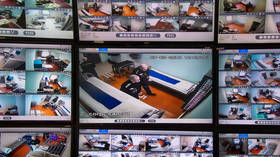Russian police to include both locals and foreigners in new database of facial images, fingerprints and genomic information

Russia's Ministry of Internal Affairs is planning to create a biometric data bank of facial images and fingerprints for both Russians and foreigners, allowing the authorities to identify unknown people more easily.
Over the next three years, the department will develop new software, enabling the government to more efficiently store data collected about people inside the country. The agency also noted that such a database would allow quicker identification of dead bodies, if necessary.
Speaking to Moscow news agency TASS, a source explained that the database will also include genomic information.
Also on rt.com Big Brother ain't so bad, after all? Almost half of Muscovites support city's ever-expanding facial recognition systemThe idea of creating a combined database of information is not a new one, having been proposed in 2014 by long-serving Minister of Internal Affairs Vladimir Kolokoltsev. Six years ago, Kolokoltsev suggested that the unified database should include DNA analysis and information, as well as vehicles and forensic records.
Earlier this year, the ministry announced it would be creating a Federal Biometric Information System. When it's launched at the end of 2021, the pilot system should be able to analyze videos to recognize criminals by their face, voice, eyes, visible tattoos, and even possibly their gait.
Facial recognition technology has long been part of the Russian police arsenal. In Moscow, in particular, smart cameras are ubiquitous, and the system enjoys support from the majority of Muscovites. In September, it was revealed that the technology would be rolled out throughout the country, with 10 large cities due to receive thousands of CCTV cameras.
The technology has not been without controversy, however. Once the new biometric bank is completed, the authorities will have to work hard to keep the information secret. Earlier this year, a Moscow woman decided to sue the city mayor's office after managing to buy her own data on the dark web for just 16,000 rubles ($210).
Think your friends would be interested? Share this story!













